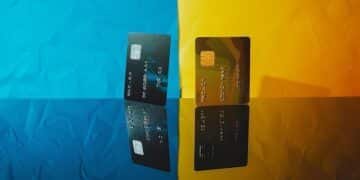Credit Card Guide: Build Credit Responsibly (Beginner Tips)

Using a credit card responsibly is a powerful way to build and improve your credit score, involving strategies such as paying bills on time, keeping your credit utilization low, and understanding the terms and conditions of your card agreement.
Learning how to use a credit card responsibly to build credit is a crucial step towards financial health. This guide offers beginner-friendly tips to help you navigate the world of credit cards and establish a strong credit history.
Understanding Credit Scores and Why They Matter
Credit scores play a vital role in your financial life, influencing everything from loan approvals to interest rates. Understanding the basics of credit scores and their importance is the first step in how to use a credit card responsibly to build credit.
What is a Credit Score?
A credit score is a three-digit number that reflects your creditworthiness, based on your credit history. It helps lenders assess the risk of lending you money.
Why is a Good Credit Score Important?
A good credit score can unlock various financial benefits, making it easier and more affordable to borrow money.
- Loan Approvals: A higher credit score increases your chances of getting approved for loans, mortgages, and credit cards.
- Lower Interest Rates: With a good credit score, you’re more likely to qualify for lower interest rates, saving you money over the life of the loan.
- Better Insurance Rates: Some insurance companies use credit scores to determine premiums, so a good score can lead to lower insurance costs.
- Rental Applications: Landlords often check credit scores as part of the rental application process. A good score can improve your chances of securing your desired apartment.
Understanding your credit score and its impact on your financial well-being is essential for making informed decisions and building a healthy financial future. By managing your credit responsibly, you can improve your score and unlock numerous opportunities.

Choosing the Right Credit Card
Selecting the right credit card is a key step when considering how to use a credit card responsibly to build credit. With so many options available, it’s essential to choose a card that aligns with your financial goals and spending habits.
Factors to Consider When Choosing a Credit Card:
Before applying for a credit card, evaluate several factors to ensure it’s the right fit for you.
- Interest Rates (APR): Look for cards with low annual percentage rates (APRs), especially if you plan to carry a balance.
- Fees: Pay attention to annual fees, late payment fees, and other charges associated with the card.
- Rewards Programs: Consider cards that offer rewards, such as cashback, travel points, or discounts. Choose a program that matches your spending patterns.
- Credit Limit: Aim for a card with a credit limit that aligns with your spending needs but doesn’t tempt you to overspend.
Choosing the right credit card requires careful consideration of your financial situation and goals. By evaluating interest rates, fees, rewards programs, and credit limits, you can select a card that helps you build credit responsibly while maximizing the benefits.
Making Timely Payments
One of the most critical aspects of how to use a credit card responsibly to build credit is making timely payments. Payment history is a significant factor in determining your credit score, so consistently paying your bills on time can have a positive impact.
To ensure you never miss a payment, consider setting up automatic payments through your bank or credit card issuer. This way, you can schedule payments in advance and avoid late fees and negative marks on your credit report.
Automating Your Payments
Automating your payments is a proactive step toward managing your credit card responsibly and safeguarding your credit score.
- Set Up Automatic Payments: Most credit card issuers allow you to set up automatic payments from your bank account. This ensures that at least the minimum payment is made on time each month.
- Choose Your Payment Amount: You can typically choose to pay the minimum amount due, the full balance, or a custom amount each month. Paying more than the minimum can help you reduce your balance and save on interest charges.
- Monitor Your Account: Even with automatic payments set up, it’s essential to monitor your credit card account regularly to ensure payments are processed correctly and to keep track of your spending.
- Avoid Overdraft Fees: Be sure to have sufficient funds in your bank account to cover your automatic payments. Otherwise, you may incur overdraft fees from your bank.
Consistently paying your credit card bills on time is crucial for building a positive credit history and improving your credit score. By setting up reminders, automating payments, and understanding the impact of payment history, you can take control of your credit card management and achieve your financial goals.

Keeping Credit Utilization Low
Another crucial aspect of how to use a credit card responsibly to build credit is keeping your credit utilization low. Credit utilization refers to the amount of credit you’re using compared to your total available credit.
Lenders look at your credit utilization ratio to assess how well you manage your credit. Experts recommend keeping your credit utilization below 30% to demonstrate responsible credit behavior.
Strategies for Keeping Credit Utilization Low
Managing your credit utilization effectively requires a few strategies to ensure you stay within recommended limits.
- Monitor Your Spending: Keep track of your credit card spending to avoid exceeding your credit limit or getting close to it.
- Pay Down Balances: Make extra payments throughout the month to reduce your outstanding balance and lower your credit utilization ratio.
- Request a Credit Limit Increase: If you’re able to manage your spending responsibly, consider requesting a credit limit increase from your credit card issuer. This can lower your credit utilization ratio without changing your spending habits.
- Avoid Maxing Out Your Card: Maxing out your credit card can significantly harm your credit score and signal to lenders that you’re a high-risk borrower.
Keeping your credit utilization low is essential for maintaining a healthy credit score and demonstrating responsible credit management. By monitoring your spending, paying down balances, and avoiding maxing out your card, you can effectively manage your credit utilization ratio and improve your creditworthiness.
Understanding Credit Card Terms and Conditions
A key part of how to use a credit card responsibly to build credit involves understanding the fine print of your credit card agreement. Credit card terms and conditions outline the rules and responsibilities associated with using your credit card, including interest rates, fees, and other important details.
Key Terms to Understand
Familiarize yourself with some key terms commonly found in credit card agreements.
- Annual Percentage Rate (APR): The annual interest rate charged on outstanding balances.
- Grace Period: The period between the end of a billing cycle and the date your payment is due, during which you can avoid paying interest on new purchases.
- Minimum Payment: The smallest amount you’re required to pay each month to keep your account in good standing.
- Late Payment Fee: A fee charged if you fail to make at least the minimum payment by the due date.
Understanding the terms and conditions of your credit card agreement is crucial for making informed financial decisions and avoiding costly mistakes. By familiarizing yourself with interest rates, fees, and other important details, you can use your credit card responsibly and protect your credit score.
Regularly Monitoring Your Credit Report
As part of learning how to use a credit card responsibly to build credit, it is also essential to regularly monitor your credit report. Checking your credit report allows you to identify any errors or inaccuracies that could negatively impact your credit score.
How to Access Your Credit Report
You’re entitled to a free credit report from each of the three major credit bureaus—Equifax, Experian, and TransUnion—once every 12 months through AnnualCreditReport.com.
What to Look for in Your Credit Report
When reviewing your credit report, pay close attention to the following:
- Personal Information: Verify that your name, address, and other personal information are accurate and up-to-date.
- Account Information: Check that all of your credit accounts are listed correctly, including credit card accounts, loans, and mortgages.
- Payment History: Review your payment history for any late payments or missed payments, as these can negatively impact your credit score.
- Inquiries: Take note of any inquiries on your credit report, as too many inquiries in a short period of time can lower your score.
Regularly monitoring your credit report provides peace of mind and helps you stay in control of your financial future. By taking advantage of your free credit reports and promptly addressing any errors or inaccuracies, you can ensure that your credit score accurately reflects your creditworthiness and financial responsibility.
| Key Point | Brief Description |
|---|---|
| 🗓️ Timely Payments | Pay all your bills on time to build a positive credit history. |
| 📉 Credit Utilization | Keep your credit card balance below 30% of your credit limit. |
| 🧐 Monitor Reports | Regularly check your credit reports for errors or inconsistencies. |
| 📚 Terms & Conditions | Understanding your credit card agreement avoids surprises. |
Frequently Asked Questions
▼
When you use a credit card and make timely payments, it demonstrates to lenders that you can responsibly manage credit. This payment history is reported to credit bureaus, which then influences your credit score.
▼
A good credit utilization ratio is generally considered to be below 30%. This means that if your credit limit is $1,000, you should aim to keep your balance below $300.
▼
You should check your credit report at least once a year. You’re entitled to a free credit report from each of the three major credit bureaus annually, allowing you to monitor for any errors.
▼
If you find an error on your credit report, dispute it with the credit bureau that provided the report. Provide documentation to support your claim and follow up to ensure the error is corrected.
▼
Yes, you can build credit without using a credit card, but it may be more challenging. Other options include taking out a secured loan, becoming an authorized user on someone else’s credit card, or using a credit-builder loan.
Conclusion
In conclusion, how to use a credit card responsibly to build credit requires consistent effort and careful attention to your spending habits and financial obligations. By following these tips and staying informed, you can effectively build credit, achieve your financial goals, and secure a brighter future.





